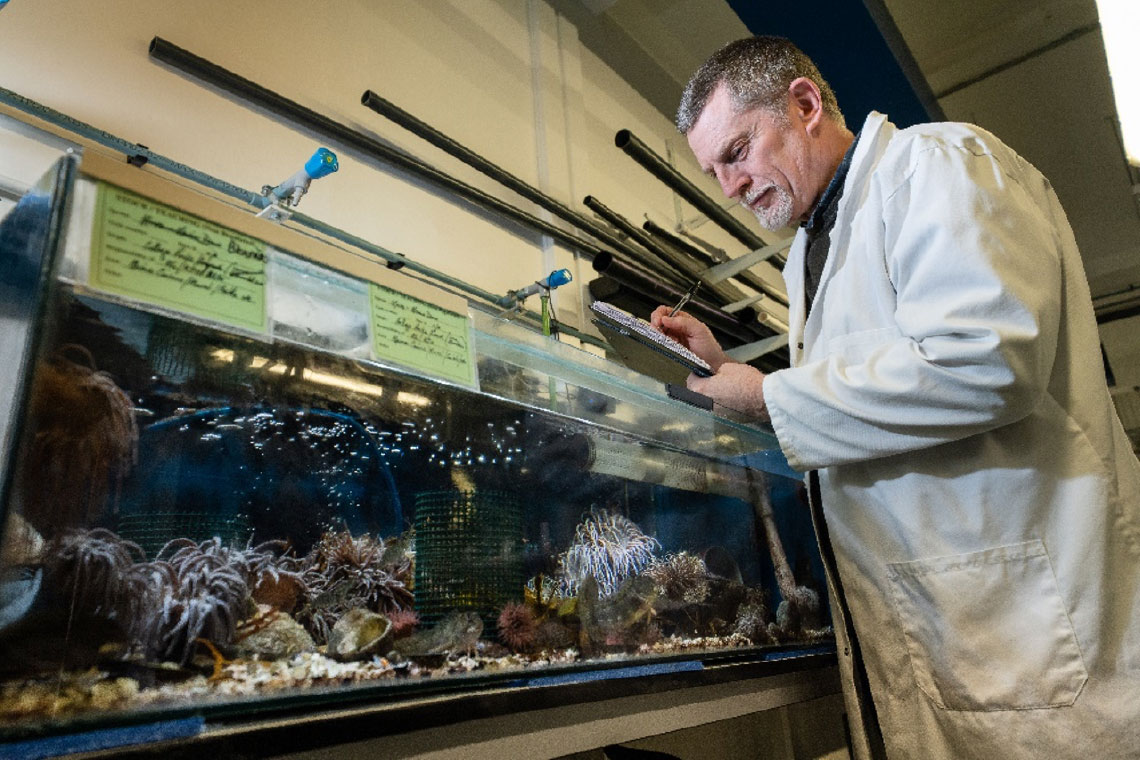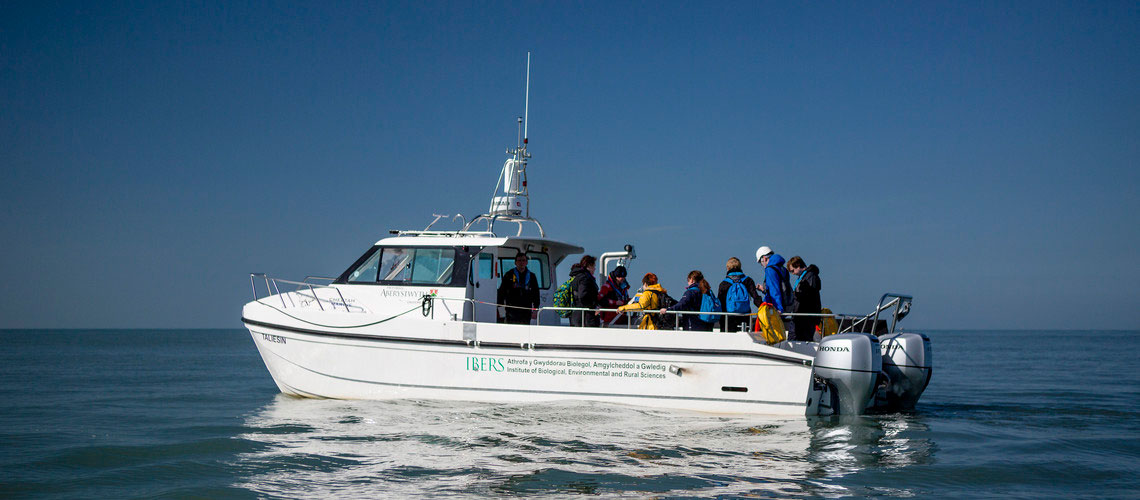Marine environmental impacts and remedies
Intro
Marine Environmental Impacts and Remedies
Climate change is having significant impacts on the global oceans, and in some sea areas at a faster rate than observed in terrestrial environments. An understanding of how climate change is affecting marine environments is vital as not only are the well-known effects of rising temperatures affecting marine species, but also the rising concentrations of carbon dioxide threaten to increasingly acidify the world oceans. Ocean acidification has predicted significant impacts on species dependent on calcium carbonate skeletons and shells, from the primary producers underpinning marine communities (microplankton) to major ecosystem engineers such as hard corals, molluscs and crustaceans.
Across IBERS our research is especially focussed on the interacting futures of sustainable food and non-food biomass production and the preservation of natural biodiversity, and the impact upon both these spheres of changing environments under predicted climate change scenarios.
Our aquatic biology research studies are aimed at understanding the responses of species to changing environments, how these responses lead to changes in demographic structures, geographical distributions or genetic diversity of populations, both in the past and predicted into the future, and how these changed circumstances may interact with other natural and anthropogenic stresses (e.g. fishing, coastal defence construction) to affect the sustainability of existing or viability of novel marine resources.
Aims
Aims
Our research addresses potential impacts of environmental change on marine communities, and means of adaptation to these impacts, both locally in Wales and the British Isles as well as globally:
- Predicting changes in marine organism distributions in response to climate change scenarios.
- Identifying and predicting impacts of invasive species.
- Sustainable management of marine natural resources, particularly fished species.
- Contributing to policy development on bio-renewables, in particular sustainable sources of non-food biomass processed for high value products and water remediation.
- Eco-engineering approaches to enhancing coastal defenses and offshore renewable energy structures.
Facilities
Facilities
Aquarium systems for marine & freshwater organisms
The IBERS aquarium facility has two large and four smaller annex rooms, all temperature and lighting controlled and supervised by trained animal welfare technicians. The system has large volume, recirculation-based filtration units, using seawater from nearby Cardigan Bay, and house local temperate marine species, tropical fish, salmonids, and a host of other plants and animals.

Boats

Next-generation Sequencing and Genotyping
IBERS has made substantial recent investments in next-generation sequencing (NGS) and genotyping infrastructure, in addition to a Sanger sequencing facility, resulting in the formation of a new Translational Genomics facility based at the Gogerddan campus.
Projects
Projects
BlueFish (http://bluefishproject.com/) is a €6.25 million EU-funded Ireland-Wales Territorial Co-operation project for the Irish and Celtic Seas regions, focusing on cross border collaboration, climate change and community engagement. BlueFish is developing knowledge and understanding of the marine resources of the Irish Sea and Celtic Seas by addressing knowledge gaps regarding the effects on, and potential vulnerability of selected commercial fish and shellfish to, predicted climate change.
ECOSTRUCTURE (http://www.ecostructureproject.eu/) is a €5.5 million European Regional Development Fund (ERDF) project through the Ireland-Wales Cooperation programme that brings together five leading universities in Wales and Ireland to research and raise awareness of eco-engineering solutions to the challenge of coastal adaptation to climate change. Ecostructure aims to promote the incorporation of secondary ecological and societal benefits into coastal defence and renewable energy structures, with benefits to the environment, to coastal communities, and to the blue and green sectors of the Irish and Welsh economies.
ARCH-UK (https://www.aquaculturehub-uk.com/) founder member. ARCH-UK supports the UKRI Aquaculture Initiative, championing science which addresses the fundamental knowledge gaps preventing the sustainable development of UK aquaculture through our eight working groups, including “Environment, Climate Change and Capacity”.
KELPER: Kelp Ecosystems in Latin-America: Pathways to Ecological Resilience. £1.2M NERC (LATAM) funded. The project is examining the ecological structure and functioning of socioeconomically important kelp forest ecosystems in South America. The aim of the project is to better our understanding of environmental, ecological and social drivers of kelp deforestation and to improve sustainable management of an important regional fishery under climate change scenarios.

Principal Investigators
Principal Investigators
| Picture | Name | Telephone | |
|---|---|---|---|
| Dr Sarah Dalesman | sad31@aber.ac.uk | +44 (0) 1970 622344 | |
| Dr Joe Ironside | jei@aber.ac.uk | +44 (0) 1970 621518 |
